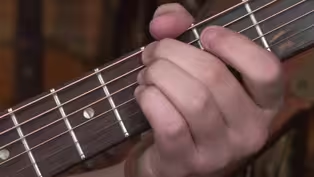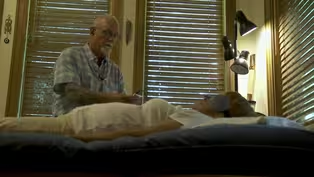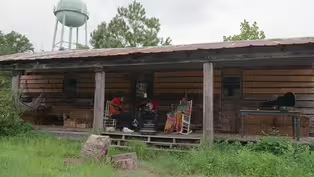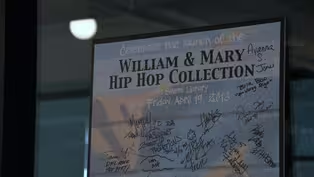VPM News Focal Point
The Hope of Music Education
Clip: Season 2 Episode 16 | 7m 27sVideo has Closed Captions
How music education is changing young lives.
A Newport News based non-profit is putting instruments in the hands of young musicians. They say it’s a way to develop life skills while enriching the children’s lives.
Problems playing video? | Closed Captioning Feedback
Problems playing video? | Closed Captioning Feedback
VPM News Focal Point is a local public television program presented by VPM
The Estate of Mrs. Ann Lee Saunders Brown
VPM News Focal Point
The Hope of Music Education
Clip: Season 2 Episode 16 | 7m 27sVideo has Closed Captions
A Newport News based non-profit is putting instruments in the hands of young musicians. They say it’s a way to develop life skills while enriching the children’s lives.
Problems playing video? | Closed Captioning Feedback
How to Watch VPM News Focal Point
VPM News Focal Point is available to stream on pbs.org and the free PBS App, available on iPhone, Apple TV, Android TV, Android smartphones, Amazon Fire TV, Amazon Fire Tablet, Roku, Samsung Smart TV, and Vizio.
Providing Support for PBS.org
Learn Moreabout PBS online sponsorshipKEYRIS MANZANARES: Music has the power to change lives and one Virginia nonprofit is hoping to do just that by exposing young people to music.
Joining us is Carol Minter, executive director of Soundscapes, an education program based in Newport News.
Thank you for being here with us, Carol.
Could you tell us about Soundscapes?
Soundscapes is a youth development organization that uses music as our tool to develop critical life skills in young people in our community and our target audience is students from early childhood all the way up through adulthood.
And we do that through three types of programs.
We have daily afterschool music programs for students where we work with students for two hours every day after school.
We have the Peninsula Youth Orchestra, where we work with more intermediate and advanced student musicians, and we have three summer camps where we work with students over the summer as well.
KEYRIS MANZANARES: Where did the idea for Soundscapes originate from?
Our co-founders, Anne Henry and Rey Ramirez were the ones who started it back in 2009.
And their idea was to start a music program that would give students something positive to do particularly in those afterschool hours.
It's really based on a program out of South America called El Sistema.
And the whole idea was to bring about social change through music.
And that's exactly what we're trying to do with Soundscapes.
KEYRIS MANZANARES: Could you tell us why your organization believes that music education is so important?
Music is really the ideal vehicle to bring about important life skills for young people.
It's something that young people are able to connect with.
People just naturally love music.
They feel comfortable with music.
They listen to music for fun.
And so by introducing these life skills through something that students already naturally enjoy, it's really just the perfect tool to work on these kinds of skills that our young people need, both to succeed in school and to succeed as engaged citizens well beyond that.
We find that ensemble learning in particular helps students to learn to listen to one another, to learn to be patient because, you know, learning an instrument, it's not easy.
Students, while they're learning music, they're going to fail.
They're going to come upon a challenge and they're going to have to keep trying.
And that perseverance is a really critical skill for them.
And so we just find that music education not only is the ideal tool for these kinds of life skills, it also develops creativity and it helps with social and emotional wellbeing as well.
KEYRIS MANZANARES: During your work with Soundscapes, has there been a specific story that has really jumped out at you?
Maybe a child who really was able to take advantage, you know, of learning to play a new instrument and really using that to their advantage?
CAROL MINTER: It's hard to pick just one.
At this point, since 2009 we've provided music education for over 1,500 students.
So to narrow it down is difficult.
But there is one student in particular whose story really continues to inspire me.
He's a student that was part of our first class in the very, very beginning.
He started as a first grader with an upside-down bucket, learning rhythm, and continued with us through the entire program.
And through that time, his family went through some very difficult times and Soundscapes really was not just a source of music education, but also a source of community and support for him.
And as time went on, he really came to love his instrument and decided that that was something that he wanted to pursue beyond high school.
And in fact, he was able to get a full scholarship to college to pursue music education.
So that's just one of many stories but one that certainly stands out to us.
KEYRIS MANZANARES: And what is next for Soundscapes?
Where does the organization see themselves in 5 or 10 years?
CAROL MINTER: Sure, that's a great question and I appreciate you asking.
So the heart of our program is our daily afterschool music program.
Our daily afterschool music program takes place right now at two elementary schools in Newport News.
And for that program, we bring professional musicians who have a training in and a passion for working with young people in and they spend two hours every day with students working on from very beginning stages of learning music all the way up to learning an instrument for the first time up to an ensemble.
And the students are able to learn a lot and progress very quickly because they spend 10 hours a week with us.
We really become a community for them.
And because we've had such wonderful experience with the students in our program and such good outcomes, the community wants to see more of Soundscapes.
We've been getting that message and we've been exploring how to grow, and in fact had an opportunity to do a feasibility study last year to figure out, what's the best way to bring more Soundscapes to the community and allow more students to participate?
And what we have discovered is that the best path forward for us is to develop a Soundscapes hub, so a building where rather than just being located in certain specific schools, we can bring students from across the community to our Soundscapes music education hub so that we'll be able to open our doors to many more students and students from across the Virginia Peninsula to begin with.
And we're really excited.
We're still a year or two out from that but we're making strides toward that growth right now and can't wait to open our door to even more students.
KEYRIS MANZANARES: If there's someone in the community now that wants to, you know, hear some of the music from the people participating in Soundscapes or just wants to know more information, how can they do that?
CAROL MINTER: Well, I'd certainly point them to our website, soundscapes.org.
We also have a wonderful YouTube channel, which it's youtube.com/soundscapeshr.
And that's a great opportunity to see some of our students but I also encourage them to come see our students live and in-person.
We do frequent performances and because the mission of our organization is all about making music and music learning accessible, our concerts are free.
And so the Peninsula Youth Orchestra performs at the American Theater in Hampton, and all of our students are going to be participating in the Virginia Community Music Festival, which is going to be in April at the Ferguson Center at Christopher Newport University.
So I don't have the dates for that memorized but I would encourage folks to go to soundscapes.org.
All of our concert dates are there on the website and we love to have folks from the community out to support our students.
KEYRIS MANZANARES: Thank you for joining us, Carol.
CAROL MINTER: Absolutely, thank you for having me.
A Young Guitar Player on Galax
Video has Closed Captions
Clip: S2 Ep16 | 1m | Lucas Nichols, a guitar player from West Virginia, plays his cover of Blackberry Blossom. (1m)
Video has Closed Captions
Clip: S2 Ep16 | 4m 14s | Discover how music has the power to heal those in addiction recovery. (4m 14s)
Video has Closed Captions
Clip: S2 Ep16 | 8m 39s | The Virginia Humanities Folklife Apprenticeship helps musicians connect to their roots. (8m 39s)
Preserving Virginia’s Hip Hop Culture
Video has Closed Captions
Clip: S2 Ep16 | 1m 55s | A university in Virginia is working to preserve hip-hop culture and history. (1m 55s)
Traditions Converge at the 87th Old Fiddler’s Convention
Video has Closed Captions
Clip: S2 Ep16 | 3m 43s | Old Time and Bluegrass music on display in Galax, Va., with bands coming from far away. (3m 43s)
Providing Support for PBS.org
Learn Moreabout PBS online sponsorship
- News and Public Affairs

Top journalists deliver compelling original analysis of the hour's headlines.

- News and Public Affairs

FRONTLINE is investigative journalism that questions, explains and changes our world.












Support for PBS provided by:
VPM News Focal Point is a local public television program presented by VPM
The Estate of Mrs. Ann Lee Saunders Brown




